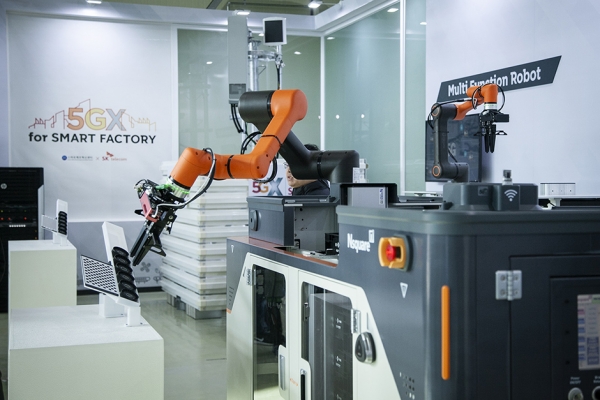Department News
[Green Economic Daily] MOU Signed with Prof. Byeng Dong Youn (OnePredict) for the Expansion of Predictive Maintenance Services
Author
관리자
Date
2021-04-14
Views
1066
B2B: Another ‘Land of Opportunity’ in 5G Business… “Telecom Corporations’ Influences Will Increase”
- 3 telecom corporations actively pursuing B2B projects via 5G… Diversifying businesses
- Developing technologies in smart factories and autonomous driving… Concentrating AI, data, and cloud services
- Korean companies eager to build 5G networks… Establishing the 28GHz band is critical
On April 3rd, 2019, smartphone-based 5G service was commercialized for the first time in the world in Korea. On this day, the three telecommunications companies—SKT, KT, and LG Uplus—each set up their own launch events, welcoming new 5G customers and promoting their services globally.
However, now at a 2-year mark since the launch of 5G commercialization, the title of being world’s first has turned out to be a double-edged sword. Continuous complaints from users have pointed out the unstable quality and insufficient coverage. Some say that “5G commercialization ended up being too rushed because of the obsession with being world’s first.”
Of course, the telecommunications industry has its own joys and sorrows. The industry has made large investments in building a nationwide 5G network, and is competing relentlessly in order to develop innovative ICT services connected with various industries. Green Economic Daily offers a three-part series of articles the history and the future of 5G business. [Editor’s Note]
5G telecommunication technology is not merely a ‘fast’ network service. With ultrahigh speed and significantly low latency, 5G technology has potential for creating new services in media/contents, smart factories, and mobility industries.
Businesses that incorporate 5G are producing promising results. Smart factories are being constructed around industrial complexes and factories. Self-driving vehicles and traffic safety areas are pushing ahead with 5G-related test businesses. B2B-exclusive cloud service is also being developed at a fast pace.
Currently, the three telecom corporations—SK Telecom, KT, and LG Uplus—are joining hands with other companies in order to further develop projects that involve B2B services. 5G technology works as a bridge that connects businesses to other businesses, forming networks.
“As of right now B2B market via 5G is at its early stages, but it will grow into a major business in the future,” a telecom industry professional said. “It doesn’tly provide circuits. Many different services can be developed. That’s why telecom corporations are venturing into such projects, working together with other companies.”

[Photo=SKT]
Three Telecom Corporations Kickstarting B2B Services in Smart Factories and Autonomous Driving
A smart factory refers to an intelligent factory that incorporates ICT technology in manufacturing and production, connecting each production process into a single network and controlling it. It can collect and share data from each process in real time, improving efficiency. Quality control can also be made easy with an automated system.
Building a smart factory requires a 5G network that can rapidly process vast amounts of data coming from the production processes. It also needs a cloud service to gather and store data, as well as AI technology that makes decisions based the data collected.
These technologies have all been mentioned by the three telecom corporations since the announcement of their ‘branching out’ from telecom. It appears that smart factories will be the new ‘battlefield’ between the corporations.
In 2019, SKT established a 5G network and a 5G-based MEC (technology that processes data at the site it is collected) at the SK Hynix factory, kickstarting the smart factory business.
In July 2020, they launched a subscription-based smart factory service aimed at helping SME manufacturers adopt smart factory solutions. Recently, they signed an MOU with fan manufacturer Tongyang cooperation in smart factory service businesses.
As for KT, they formed alliances in 2019 to further develop their smart factory business. They partnered up with Hyundai Robotics, an industrial robot company under Hyundai Heavy Industries, as well as Cognex, a top American manufacturer of machine vision systems in automated manufacturing.
Subsequently, last June, KT showcased the ‘KT 5G smart factory vision,’ which improves efficiency in product inspection using cameras and AI technology installed at the factory. After four months, they succeeded in syncing their 5G, cloud, and smart factory platforms with Hyundai Robotics’ industrial robots.
LG Uplus began building smart factories last year, targeting corporate customers with an exclusive 5G network. The 5G corporate-exclusive network offers fast and secure data connections for industrial equipment and company devices used in offices and factories.
In addition, LG Uplus signed an MOU with AI solution company OnePredict last February to expand its predictive maintenance services. Predictive maintenance technology collects data vibrations, noise, and temperature of facilities, and predicts when it will malfunction. LG Uplus plans to expand its services to cover a variety of fields.
Source : Green Economic Daily / Kyoung-yun Jang lycaon@greened.kr
Original article : http://www.greened.kr/news/articleView.html?idxno=288595

